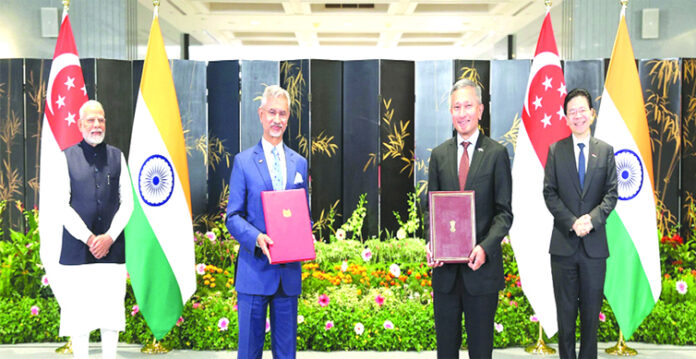India’s increasing prominence on the global stage is undeniable, as the country continues to strengthen its leadership in international forums and summits, exemplifying its forward-thinking approach to emerging global challenges.
From the recent Artificial Intelligence Summit in Paris, co-chaired by Prime Minister Narendra Modi, to its strategic involvement in key gatherings like the G20 and the Shanghai Cooperation Organization (SCO), India’s role as a prominent global player has never been more evident.
The AI Summit in Paris, which brought together global leaders to discuss the need for inclusive and responsible AI development, marked a significant moment in India’s leadership in technological advancements. Prime Minister Modi’s participation emphasized India’s commitment to ensuring AI infrastructure is accessible and serves the public good. As countries discuss the ethical and practical use of AI, India has positioned itself at the forefront, advocating for a safe and reliable decision-making framework to manage emerging technologies.
Also Read: BSNL Marks Remarkable Comeback with Rs 262 Crore Profit, First in 17 Years
India’s influence, however, extends far beyond technology. As a key player in global diplomatic circles, India’s proactive engagement in forums like the G20 and SCO reflects its ability to not only navigate complex global challenges but also contribute valuable insights into tackling issues like terrorism, economic imbalances, and climate change. Through these diplomatic engagements, India continues to demonstrate its ability to combine diplomatic acumen with a commitment to long-term peace and stability.
India’s foreign policy has long been shaped by a clear vision of cooperation, coordination, and timely crisis management. A critical aspect of this vision has been its strategic approach to combating terrorism and non-state actors. In the context of growing regional instability and global threats, India has highlighted the importance of specialized counter-terrorism training and the establishment of think tanks to provide fresh perspectives and solutions to global security issues.
One of the primary challenges India faces is bridging gaps between neighboring countries to develop comprehensive strategies for maritime security. The country’s geographical location makes it a central player in securing the Indian Ocean Area (IOA), which remains vital to international trade and security. As such, India has been at the forefront of initiatives aimed at securing the region’s waters, ensuring the free flow of goods, and protecting economic interests.
The issue of climate change has become one of the most pressing concerns in today’s increasingly interconnected world. India has actively taken steps to address environmental degradation and promote renewable energy development. Through its leadership in global climate summits and initiatives to combat environmental challenges, India is not only addressing the urgent need for sustainable power generation but also creating a pathway for collaboration in the fight against climate change.
This leadership has extended to countering expansionist projects like China’s Belt and Road Initiative (BRI). As part of its diplomatic and military strategy, India has worked to ensure regional stability by safeguarding its maritime security. The development of naval bases in key locations, such as Djibouti, and sophisticated coastal radar systems in collaboration with regional partners like Sri Lanka, Bangladesh, and the Maldives, exemplifies India’s commitment to ensuring the security of critical trade routes and responding to regional threats.
India’s diplomatic strategy is also underscored by its growing trade relations and strategic partnerships across the region. Through the “Act East” policy, India has focused on deepening ties with East Asian neighbors and building a robust network of ports and trade routes. This policy, along with the country’s extensive involvement in organizations like the Indian Ocean Rim Association (IORA), has paved the way for collaborative frameworks designed to tackle non-state challenges like piracy, smuggling, and cyber threats.
The recent Quad summit, where India reaffirmed its commitment to supporting Pacific Island countries and enhancing regional institutions, is a clear indication of India’s leadership role in the Indo-Pacific region. Through initiatives aimed at promoting maritime security, building resilient infrastructure, and addressing climate change, India continues to solidify its position as a key player in maintaining regional stability.
India’s strategic military capabilities, exemplified by advanced defense procurements like the BrahMos supersonic cruise missile and the “Necklace of Diamonds” naval strategy, further reinforce the country’s role in ensuring regional security. These initiatives, coupled with India’s commitment to enhancing its influence in the Indian Ocean region, underscore the country’s resilient and pragmatic approach to navigating a complex global landscape.
As India continues to leverage its diplomatic strength and resilience, the country remains dedicated to fostering a more secure, stable, and prosperous world. With its visionary leadership, India is uniquely positioned to drive global collaboration and progress, ensuring a future defined by cooperation and mutual benefit.
In an era of rising global challenges, India’s foreign policy not only contributes to global security but also sets the stage for long-term prosperity and peace, demonstrating the country’s readiness to lead the world toward a brighter, more interconnected future.
(This story is sourced from a third-party syndicated feed. Raavi Media takes no responsibility or liability of any nature. Raavi Media management/ythisnews.com can alter or delete the content without notice for any reason.)


